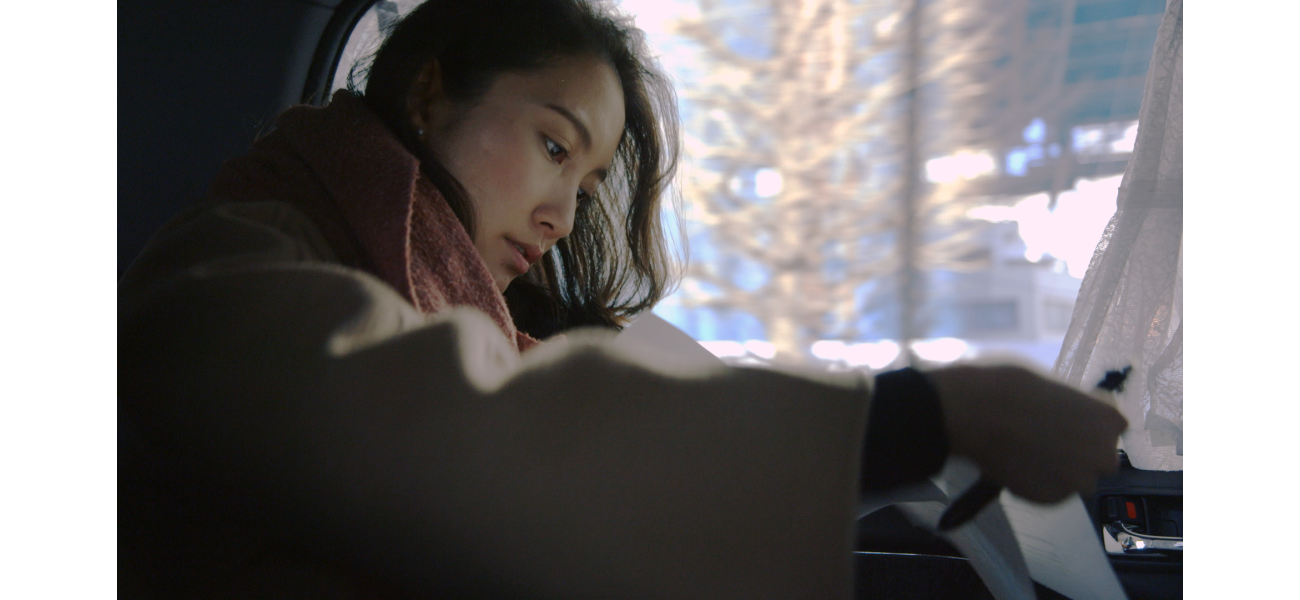A victim of sexual assault had to investigate her own case after being drugged and raped.
The person was scared because they couldn't remember what had happened.
October 12th 2024.

Shiro Ito, a journalist, is no stranger to the immense courage it takes for survivors of sexual assault to speak out. In fact, she unintentionally became the face of Japan's #MeToo movement after she was raped while unconscious in a Tokyo hotel room. Despite facing backlash and a hate campaign, Shiro made the brave decision to go public with her story. However, her bravery was met with disappointment as the authorities failed to take action.
Survivors of sexual assault not only have to endure the trauma of the actual attack, but also the aftermath. They must navigate their way through a new, unwanted identity as a survivor while trying to heal from the emotional and physical scars. Shiro experienced this firsthand after her assault in 2015. She went to the police, but was let down by their inaction. This led her to take matters into her own hands and conduct her own investigation, which caused a lot of societal backlash.
The trolling and hate Shiro received online became so severe that she felt forced to leave Japan. Since then, she has based herself in Berlin and travels the world as a journalist and documentary filmmaker. In an interview with Metro, Shiro reveals, "I had to move away. I was receiving so many threats, whenever I heard people speak Japanese it would make me feel unsafe." She goes on to explain that she feels safer when she hears English or a different language. Though the hate and trolling still continue, Shiro has found ways to avoid it, such as having an assistant filter through her emails so she doesn't have to see the hateful messages.
The aftermath of the assault also took a toll on Shiro's mental and physical health. She suffered from panic attacks, hair loss, and even had suicidal thoughts. In Japan, speaking about rape is considered taboo and only 4% of survivors report their cases to the police. This is due to the stigma and potential ostracism from society. However, Shiro felt she had no choice but to speak out when the police and prosecutors failed to deliver justice.
Shiro's ordeal began when she emailed a high-ranking TV correspondent, Noriyuki Yamaguchi, to inquire about potential employment opportunities. The pair met up for dinner and drinks, and Shiro remembers feeling lightheaded before blacking out. She woke up in a hotel room with intense pain and no recollection of what had happened. In her documentary, Black Box Diaries, Shiro recalls, "I woke with intense pain in my lower abdomen. I didn't know where I was or who was on top of me. I tried to push him away, but he was too strong, and I panicked."
The process of filming and editing her documentary was grueling for Shiro, but she is relieved to have completed it. She amassed 400 hours of footage for the documentary, which chronicles her experiences. Shiro also recalls how she managed to escape from Noriyuki's grasp and lock herself in the bathroom. "In the mirror, I saw my nipple bleeding, bruises on my arm and other body parts. Having no memory about what had happened. I was terrified. I needed to calm down, find my clothes and get out," she explains.
Shiro's attempts to escape were successful, but she was still traumatized by the experience. She suffered from nightmares and panic attacks, and even fell into periods of immobility where her body wouldn't move for days. At one point, she even attempted suicide and filmed a tearful final message for her parents. Thankfully, she was taken to the hospital and her life was saved. However, even small triggers like the sight of cherry blossoms would bring on panic attacks due to the memories they triggered.
After her assault, Shiro went to the police to make a report, but was met with a poor response. In Japan, the law at the time only considered rape to be proven by physical violence and threats, not lack of consent. This outdated law, coupled with the response from the police, led to Shiro's case being dropped. Frustrated and determined, she took matters into her own hands and started investigating on her own. She interviewed the taxi driver who drove them to the hotel, examined CCTV footage, and even recorded her conversations with investigators and prosecutors.
Through her investigation, Shiro uncovered disturbing information. The taxi driver revealed that she had asked to be let out of the car multiple times, but Noriyuki insisted on taking her to the hotel. CCTV footage showed her being half-dragged into the hotel, and a doorman reported that she seemed intoxicated and had tried to escape. In June, Shiro was told by another officer that the initial investigator was transferred because he was "good at his job." However, he later contacted her off the record and told her that they did in fact have a warrant for Noriyuki's arrest, but it was halted by a call from the higher-ups.
Despite the challenges and backlash she faced, Shiro waived her right to anonymity and held a press conference in 2016. She continues to be a vocal advocate for survivors of sexual assault and hopes to bring about change in Japan's outdated laws and societal views on rape. For those who need support, Shiro encourages them to reach out to organizations like Samaritans, who are available 24/7. As for herself, Shiro has found strength and resilience in her journey, and her documentary serves as a powerful testimony to her bravery and determination.
When you hear stories about sexual assault, you often come across tales of bravery from the survivors. Unfortunately, in these cases, the victims face not just one, but two assaults. The first, the actual attack, and the second, the aftermath, where they must navigate the trauma while also trying to come to terms with their new identity as a survivor. Shiori Ito knows this all too well. She unintentionally became the face of Japan's #MeToo movement after she was raped while unconscious in a Tokyo hotel room.
Shiori, a journalist, decided to speak out about her experience, only to be met with a shocking backlash. She was subjected to a hate campaign that was beyond belief. In an attempt to seek justice, Shiori had gone to the police after the attack in 2015. However, she was let down by their lack of action. She then took matters into her own hands and conducted her own investigation, a brave and courageous move that was met with immense societal wrath. As a result, Shiori was forced to leave Japan and has since been based in Berlin while traveling the world for her work as a journalist and documentary filmmaker.
In a recent phone call with Metro, Shiori shared how the hate and trolling had gotten so out of control that she had no choice but to move away. She was receiving numerous threats, and even the sound of Japanese being spoken made her feel unsafe. English or other languages, on the other hand, brought her a sense of security. Though the trolling still continues, Shiori has found ways to avoid it, such as having an assistant go through her emails so she doesn't have to face the hateful messages in the morning.
The toll of the 2015 attack was immense for Shiori. She suffered from panic attacks, hair loss, and even contemplated suicide. In a country where talking about rape is still considered taboo, only 4% of survivors report their cases to the police. This is due to the stigma and ostracization they may face from society. But for Shiori, speaking up was the only option as the police and prosecutors failed to deliver justice.
It all began when Shiori emailed a high-ranking TV correspondent, Noriyuki Yamaguchi, more than a decade ago, asking about employment opportunities. The two met at a Tokyo bar to discuss work, where they ate sushi and had a moderate amount of sake. However, Shiori started feeling lightheaded and excused herself to go to the bathroom. This was the last thing she remembered. Her next memory was waking up in a strange hotel room in the early hours of the morning.
"I woke up with intense pain in my lower abdomen, not knowing where I was or who was on top of me. I tried to push him away, but he was too strong, and I panicked," Shiori shares in her new documentary, Black Box Diaries, where she chronicles her experiences. It is clear that talking about it now brings her a sense of relief, having gone through the grueling process of filming and editing the program.
Shiori had gathered over 400 hours of footage for her documentary, where she recalls how she managed to break free from Noriyuki and run to the bathroom, locking the door behind her. In the mirror, she saw bruises and bleeding on her body, with no memory of what had happened. She was terrified and needed to calm down, find her clothes, and leave. However, when she opened the door, Noriyuki grabbed her arm and forced her back onto the bed. She remembers feeling like she couldn't breathe, thinking she might die. She pleaded with him to stop, even swearing at him, before finally managing to escape. She asked for her underwear, which he initially refused to give back, saying he wanted to keep it as a souvenir. But he eventually returned it, and Shiori left the hotel at 5:50 am and went home.
If you or someone you know needs support, you can contact Samaritans for free, 24/7, 365 days a year. The attack had a severe impact on Shiori, leaving her traumatized. She suffered from nightmares, panic attacks, and even hair loss. There were days when her body wouldn't move, and she was unable to do anything. She even reached a point where she attempted suicide, recording a tearful final message for her parents. Thankfully, she was taken to the hospital and her life was saved. In the years that followed, the sight of cherry blossoms would trigger her memory of the spring assault, causing her to have panic attacks.
Shiori had initially gone to the police to report the rape, but their response was poor. In Japan, in 2015, rape could only be proven by severe physical violence and threats, not by lack of consent, due to outdated laws. The investigator in charge, "Investigator A," told her that there wasn't enough evidence, and the case was dropped. So Shiori took matters into her own hands and started investigating. She interviewed the taxi driver who had driven them from the bar, examined CCTV footage from inside and outside the hotel, and gathered transcripts of her conversations with the investigators and prosecutors. She felt like they weren't doing their job, and all she heard were excuses. So she hid a small recorder in her bra and captured conversations with whoever she could.
What Shiori uncovered was disturbing. The taxi driver revealed that she had asked to be let out of the cab at the train station, but Noriyuki insisted on going to the hotel. CCTV footage from outside the hotel showed Shiori being half-dragged from the car, and inside, another camera captured a disheveled Shiori being escorted by Noriyuki through the lobby. A doorman later informed Shiori that she had tried to escape and seemed intoxicated.
In June of that year, Shiori was told by another officer that Investigator A had been transferred because he was "good at his job." But he later contacted her, off the record, revealing that there was, in fact, a warrant for Noriyuki's arrest. However, just as they were about to apprehend him, they received a call from higher-ups instructing them to stop. "If I go against the higher-ups, I'll be known as a traitor. I still don't know why they stopped the arrest," Investigator A told her.
Survivors of sexual assault not only have to endure the trauma of the actual attack, but also the aftermath. They must navigate their way through a new, unwanted identity as a survivor while trying to heal from the emotional and physical scars. Shiro experienced this firsthand after her assault in 2015. She went to the police, but was let down by their inaction. This led her to take matters into her own hands and conduct her own investigation, which caused a lot of societal backlash.
The trolling and hate Shiro received online became so severe that she felt forced to leave Japan. Since then, she has based herself in Berlin and travels the world as a journalist and documentary filmmaker. In an interview with Metro, Shiro reveals, "I had to move away. I was receiving so many threats, whenever I heard people speak Japanese it would make me feel unsafe." She goes on to explain that she feels safer when she hears English or a different language. Though the hate and trolling still continue, Shiro has found ways to avoid it, such as having an assistant filter through her emails so she doesn't have to see the hateful messages.
The aftermath of the assault also took a toll on Shiro's mental and physical health. She suffered from panic attacks, hair loss, and even had suicidal thoughts. In Japan, speaking about rape is considered taboo and only 4% of survivors report their cases to the police. This is due to the stigma and potential ostracism from society. However, Shiro felt she had no choice but to speak out when the police and prosecutors failed to deliver justice.
Shiro's ordeal began when she emailed a high-ranking TV correspondent, Noriyuki Yamaguchi, to inquire about potential employment opportunities. The pair met up for dinner and drinks, and Shiro remembers feeling lightheaded before blacking out. She woke up in a hotel room with intense pain and no recollection of what had happened. In her documentary, Black Box Diaries, Shiro recalls, "I woke with intense pain in my lower abdomen. I didn't know where I was or who was on top of me. I tried to push him away, but he was too strong, and I panicked."
The process of filming and editing her documentary was grueling for Shiro, but she is relieved to have completed it. She amassed 400 hours of footage for the documentary, which chronicles her experiences. Shiro also recalls how she managed to escape from Noriyuki's grasp and lock herself in the bathroom. "In the mirror, I saw my nipple bleeding, bruises on my arm and other body parts. Having no memory about what had happened. I was terrified. I needed to calm down, find my clothes and get out," she explains.
Shiro's attempts to escape were successful, but she was still traumatized by the experience. She suffered from nightmares and panic attacks, and even fell into periods of immobility where her body wouldn't move for days. At one point, she even attempted suicide and filmed a tearful final message for her parents. Thankfully, she was taken to the hospital and her life was saved. However, even small triggers like the sight of cherry blossoms would bring on panic attacks due to the memories they triggered.
After her assault, Shiro went to the police to make a report, but was met with a poor response. In Japan, the law at the time only considered rape to be proven by physical violence and threats, not lack of consent. This outdated law, coupled with the response from the police, led to Shiro's case being dropped. Frustrated and determined, she took matters into her own hands and started investigating on her own. She interviewed the taxi driver who drove them to the hotel, examined CCTV footage, and even recorded her conversations with investigators and prosecutors.
Through her investigation, Shiro uncovered disturbing information. The taxi driver revealed that she had asked to be let out of the car multiple times, but Noriyuki insisted on taking her to the hotel. CCTV footage showed her being half-dragged into the hotel, and a doorman reported that she seemed intoxicated and had tried to escape. In June, Shiro was told by another officer that the initial investigator was transferred because he was "good at his job." However, he later contacted her off the record and told her that they did in fact have a warrant for Noriyuki's arrest, but it was halted by a call from the higher-ups.
Despite the challenges and backlash she faced, Shiro waived her right to anonymity and held a press conference in 2016. She continues to be a vocal advocate for survivors of sexual assault and hopes to bring about change in Japan's outdated laws and societal views on rape. For those who need support, Shiro encourages them to reach out to organizations like Samaritans, who are available 24/7. As for herself, Shiro has found strength and resilience in her journey, and her documentary serves as a powerful testimony to her bravery and determination.
When you hear stories about sexual assault, you often come across tales of bravery from the survivors. Unfortunately, in these cases, the victims face not just one, but two assaults. The first, the actual attack, and the second, the aftermath, where they must navigate the trauma while also trying to come to terms with their new identity as a survivor. Shiori Ito knows this all too well. She unintentionally became the face of Japan's #MeToo movement after she was raped while unconscious in a Tokyo hotel room.
Shiori, a journalist, decided to speak out about her experience, only to be met with a shocking backlash. She was subjected to a hate campaign that was beyond belief. In an attempt to seek justice, Shiori had gone to the police after the attack in 2015. However, she was let down by their lack of action. She then took matters into her own hands and conducted her own investigation, a brave and courageous move that was met with immense societal wrath. As a result, Shiori was forced to leave Japan and has since been based in Berlin while traveling the world for her work as a journalist and documentary filmmaker.
In a recent phone call with Metro, Shiori shared how the hate and trolling had gotten so out of control that she had no choice but to move away. She was receiving numerous threats, and even the sound of Japanese being spoken made her feel unsafe. English or other languages, on the other hand, brought her a sense of security. Though the trolling still continues, Shiori has found ways to avoid it, such as having an assistant go through her emails so she doesn't have to face the hateful messages in the morning.
The toll of the 2015 attack was immense for Shiori. She suffered from panic attacks, hair loss, and even contemplated suicide. In a country where talking about rape is still considered taboo, only 4% of survivors report their cases to the police. This is due to the stigma and ostracization they may face from society. But for Shiori, speaking up was the only option as the police and prosecutors failed to deliver justice.
It all began when Shiori emailed a high-ranking TV correspondent, Noriyuki Yamaguchi, more than a decade ago, asking about employment opportunities. The two met at a Tokyo bar to discuss work, where they ate sushi and had a moderate amount of sake. However, Shiori started feeling lightheaded and excused herself to go to the bathroom. This was the last thing she remembered. Her next memory was waking up in a strange hotel room in the early hours of the morning.
"I woke up with intense pain in my lower abdomen, not knowing where I was or who was on top of me. I tried to push him away, but he was too strong, and I panicked," Shiori shares in her new documentary, Black Box Diaries, where she chronicles her experiences. It is clear that talking about it now brings her a sense of relief, having gone through the grueling process of filming and editing the program.
Shiori had gathered over 400 hours of footage for her documentary, where she recalls how she managed to break free from Noriyuki and run to the bathroom, locking the door behind her. In the mirror, she saw bruises and bleeding on her body, with no memory of what had happened. She was terrified and needed to calm down, find her clothes, and leave. However, when she opened the door, Noriyuki grabbed her arm and forced her back onto the bed. She remembers feeling like she couldn't breathe, thinking she might die. She pleaded with him to stop, even swearing at him, before finally managing to escape. She asked for her underwear, which he initially refused to give back, saying he wanted to keep it as a souvenir. But he eventually returned it, and Shiori left the hotel at 5:50 am and went home.
If you or someone you know needs support, you can contact Samaritans for free, 24/7, 365 days a year. The attack had a severe impact on Shiori, leaving her traumatized. She suffered from nightmares, panic attacks, and even hair loss. There were days when her body wouldn't move, and she was unable to do anything. She even reached a point where she attempted suicide, recording a tearful final message for her parents. Thankfully, she was taken to the hospital and her life was saved. In the years that followed, the sight of cherry blossoms would trigger her memory of the spring assault, causing her to have panic attacks.
Shiori had initially gone to the police to report the rape, but their response was poor. In Japan, in 2015, rape could only be proven by severe physical violence and threats, not by lack of consent, due to outdated laws. The investigator in charge, "Investigator A," told her that there wasn't enough evidence, and the case was dropped. So Shiori took matters into her own hands and started investigating. She interviewed the taxi driver who had driven them from the bar, examined CCTV footage from inside and outside the hotel, and gathered transcripts of her conversations with the investigators and prosecutors. She felt like they weren't doing their job, and all she heard were excuses. So she hid a small recorder in her bra and captured conversations with whoever she could.
What Shiori uncovered was disturbing. The taxi driver revealed that she had asked to be let out of the cab at the train station, but Noriyuki insisted on going to the hotel. CCTV footage from outside the hotel showed Shiori being half-dragged from the car, and inside, another camera captured a disheveled Shiori being escorted by Noriyuki through the lobby. A doorman later informed Shiori that she had tried to escape and seemed intoxicated.
In June of that year, Shiori was told by another officer that Investigator A had been transferred because he was "good at his job." But he later contacted her, off the record, revealing that there was, in fact, a warrant for Noriyuki's arrest. However, just as they were about to apprehend him, they received a call from higher-ups instructing them to stop. "If I go against the higher-ups, I'll be known as a traitor. I still don't know why they stopped the arrest," Investigator A told her.
[This article has been trending online recently and has been generated with AI. Your feed is customized.]
[Generative AI is experimental.]
0
0
Submit Comment





